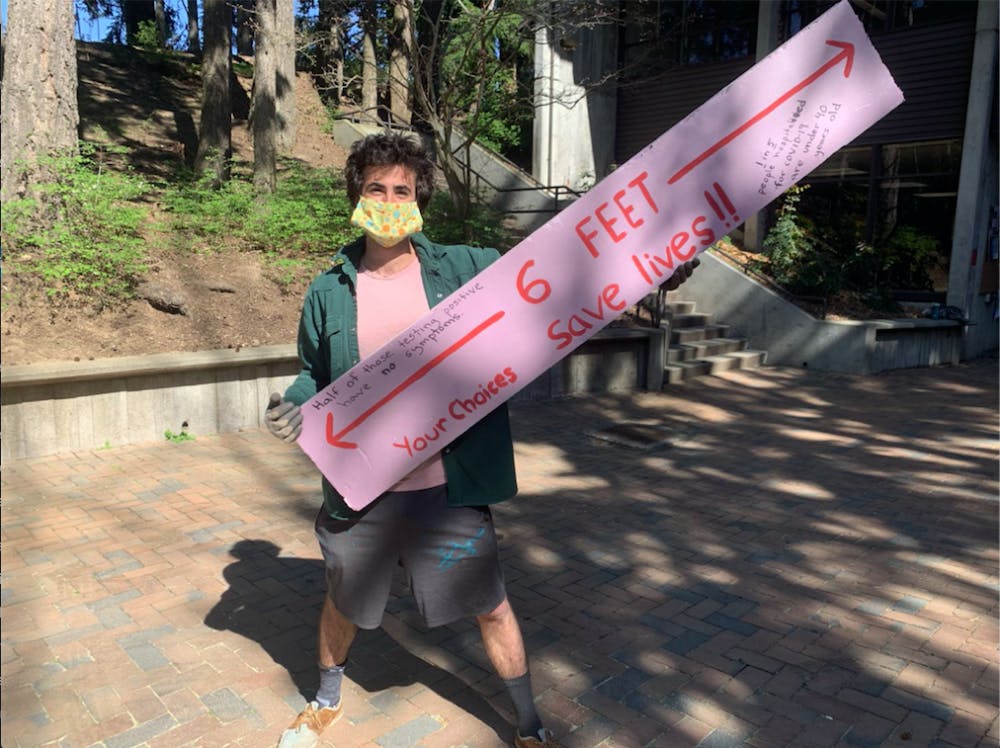
Closure of buildings around Western pushes the Enrollment Student Services working group to find a way to feed students
By Becca Dudek
The current pandemic has closed most buildings, excluding the southern dorms and dining halls, on Western’s campus. This has left students experiencing food insecurity without access to the food pantry located on the fifth floor of the Viking Union. The Enrollment Student Services working group decided to open pop-up food pantries to help students who are still in Bellingham and in need of meals.
Leti Romo, who has a doctorate in education and is the assistant director of Student Representation and Governance, said the working group started brainstorming ways to get meals to students when the university first closed. They soon realized the campus would be closed the entire quarter.
Romo said during this process, The Outback Farm Manager, Terri Kempton, called her to speak about the same problems she wanted to combat. Romo said with a majority of the help from Karen Deysher, AS Student Advocacy and Identity Resource Centers Coordinator, and Kempton, they finally started to plan these pop-ups.
According to Romo, these pop-ups adhere to CDC guidelines and help students know that the working group is there to support them. They were originally set up outside Fairhaven College but are now located in the Viking Commons.
“All tables are at least 6-feet apart and there’s a few of them — so it’s not like there’s only one table and you have to wait in this long line,” Romo said. “We have markings, similar to what Trader Joe’s is doing on the floor, where it’s like ‘this is where you stand.’”
Romo said there were webinars for other universities to talk with each other about the pandemic and response to students experiencing food insecurity. The working group wants to make sure this can be adopted when students return to campus, as it could be a prevailing issue.
Romo said the pop-ups will become weekly on Wednesdays starting May 6. They will run from 12-2 p.m. until the end of the spring quarter outside the Viking Commons.
According to Kempton, The Outback staff and the working group were not the only ones that came together for this. Dining Services and Aramark helped with the execution of the overall plan. Kempton said Aramark facilitates buying and packing up the food.
Romo said Aramark buys the food, but the working group still pays for it at a reduced rate.
Michael Sledge, Western’s associate dean of Student Support Services, said Student Support Services don’t try to pin down one specific definition of food insecurity. They don’t verify what situation the student is in that may have caused their food issues.
“It’s highly dependent on the individual’s circumstances,” Sledge said. “Our efforts are key to allowing the student to identify their own need[s] and their own food insecurity.”
Sledge said he advises students to visit the student service’s new site, which provides links to different resources to help students during the pandemic.
Kempton said food insecurity at Western has been something The Outback has been trying to help with since its creation. A 2017 study conducted by past students Katelyn Notestine, Makena DeGolier and Emily Schauble and advised by Seth Vidaña showed that 68% of students on campus had skipped or skimped out of meals due to financial issues.
“The purpose of The Outback Farm is both to provide an opportunity to learn about food and farming but also to have people growing food for students. The pandemic has really brought into high relief the need that our campus has to address food insecurity,” Kempton said.
Vidaña used to be Western’s director of Sustainability but is now Bellingham’s first Climate and Energy Manager. He said in an email that the study prompted those behind it to advise Western to come up with a plan to address food insecurity on campus.
“The main take away was that we were following national averages in the prevalence of food insecurity on campus and that we needed to formulate a campus response to the problem,” Vidaña wrote in an email.
Lena Hemmer, an environmental science graduate from Western, also conducted a smaller and more recent survey in 2018 with professor Kate Darby and fellow graduate Renee Holt that looked at the coping mechanisms and emotional states for 21 students experiencing food insecurity at Western.
The study found many of the students either couldn’t afford food, were worried about their food running out, or were already running out of food and cited reasons such as having to pay for college themselves, minimum wage and rent prices for the struggle of getting food.
Kempton said The Outback is trying to stay active on social media to help students through the pandemic. They may start filming cooking videos to show what students can make with the food from the pop-ups.
Romo said the working group will continue to help students through these troubling times. They are finding other options such as dining hall swipes, grocery gift cards and meal kits for students who are experiencing food insecurity. Romo said the original food pantry in the VU also included clothes and hygiene products in an attempt to not just help with food but with the overall struggles students are facing.
“If we think about [food] as a single issue then we are totally losing the whole picture of how to help and combat some of these things,” Romo said.





